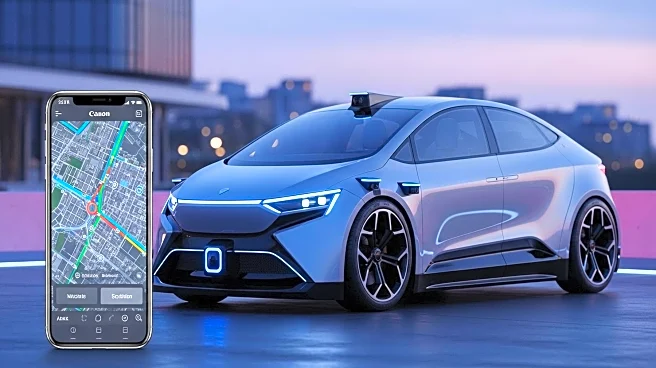What's Happening?
Tesla has expanded its Robotaxi service to the public in Austin, Texas, following a period of testing with invited members. The company launched a new iOS app, allowing users to join a waitlist for the service. The Robotaxi program, which utilizes self-driving Model Ys, aims to attract commuters and locals seeking a driverless ride experience. Tesla's Robotaxi service area in Austin has grown to 190 square miles, surpassing Waymo's coverage in the city. The expansion includes routes to Tesla's Giga Texas factory, Austin's airport, and freeway routes, with safety monitors present during high-speed stretches.
Why It's Important?
Tesla's move to open its Robotaxi service to the public marks a significant step in its driverless vehicle initiative. By expanding access, Tesla is positioning itself as a leader in autonomous transportation, potentially influencing the future of ride-hailing services. The rapid rollout of the app demonstrates Tesla's confidence in its technology and readiness for broader adoption. This development could accelerate the acceptance of autonomous vehicles, impacting transportation infrastructure and consumer behavior. As Tesla competes with companies like Waymo, the expansion of Robotaxi services may drive innovation and investment in the autonomous vehicle sector.
What's Next?
Tesla's Robotaxi program is likely to continue expanding, with potential testing in other cities like San Francisco. The company may focus on refining its technology and addressing regulatory challenges associated with autonomous driving. As the service gains traction, Tesla could explore partnerships with local governments and transportation agencies to integrate Robotaxis into existing transit systems. The success of the program may prompt other automakers to accelerate their autonomous vehicle initiatives, leading to increased competition and collaboration in the industry.
Beyond the Headlines
The introduction of Robotaxis raises questions about the future of urban mobility and the role of human drivers in transportation. Ethical considerations regarding safety, privacy, and data usage may emerge as autonomous vehicles become more prevalent. Additionally, the environmental impact of widespread autonomous vehicle adoption could influence discussions on sustainable transportation solutions.









